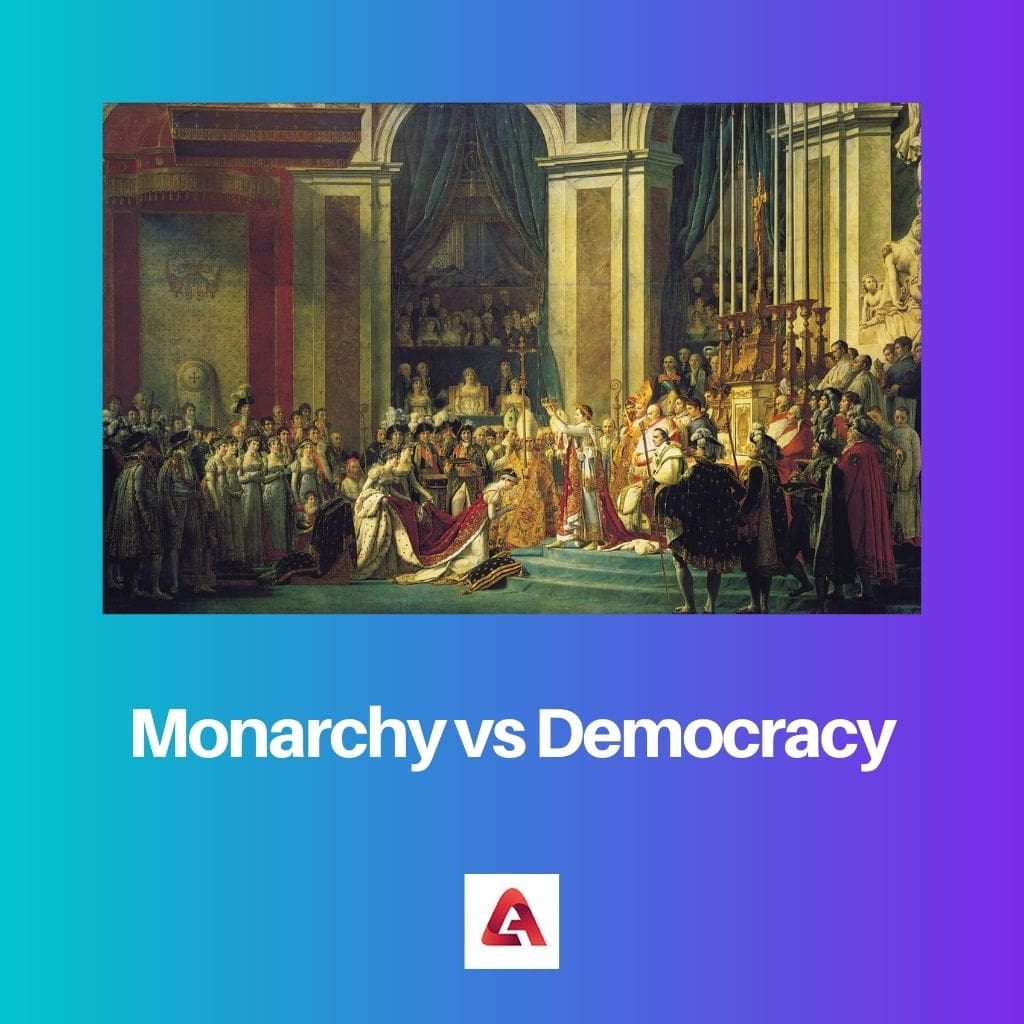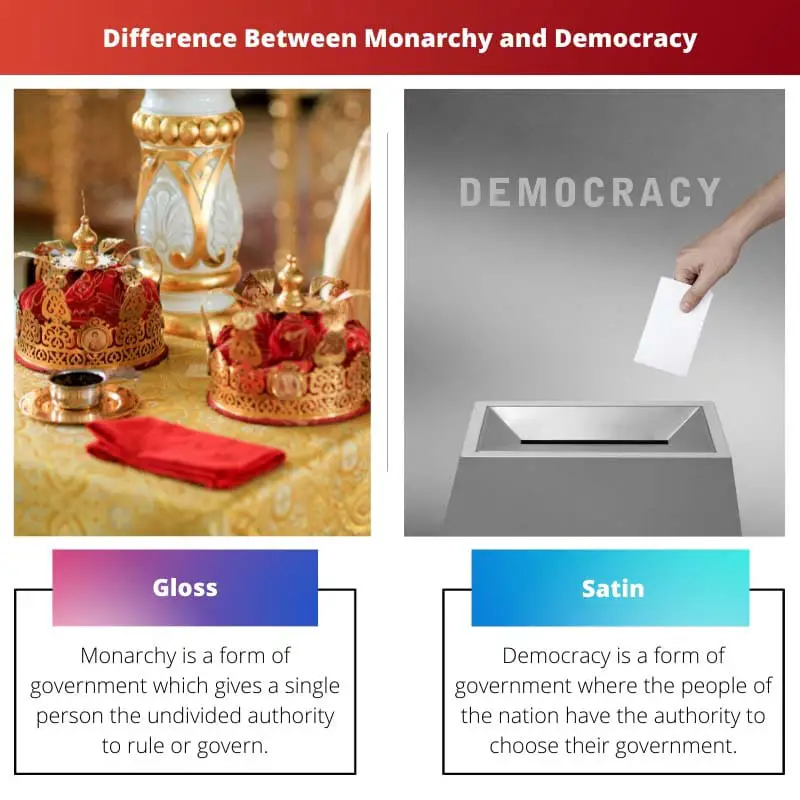Every nation is ruled or headed by a governing body, also known as a government. It was done to maintain the law and generate rules and regulations.
Supreme powers were given to a single person to handle everything under his authority.
But eventually, people realized if all the powers were given to a single person, commonly known as a monarch, he might dictate and misuse his powers rather than resolve matters.
This thought gave birth to the idea of democracy, where the people themselves choose their government.
Key Takeaways
- A monarchy is a form of government in which a single ruler, such as a king or queen, holds supreme power; democracy is a form of government in which the people hold power through elected representatives.
- In a monarchy, power is inherited or obtained through force, while in a democracy, power is obtained through free and fair elections.
- Monarchies tend to be more centralized and hierarchical, while democracies allow for more participation and representation from diverse citizens.
Monarchy vs Democracy
A monarchy is a form of government in which the monarch is considered the king of the whole state. The monarch is responsible for making decisions and deciding laws and is not answerable to the nation. Democracy is the government of equality in which the head of state is accountable for his actions.

Democracy, to date, is considered the most efficient form of government. Democracy is a widely chosen form of government by a monarchy still in certain places worldwide.
Monarchy is a form of government where all the power lies in the hand of a single person. The hierarchy obtains the position, as his family previously might have ruled over the nation.
Democracy, on the other hand, is a form of government where the nation’s people choose the ruler. He, along with the other government bodies, rules the nation.
Comparison Table
| Parameter of Comparison | Monarchy | Democracy |
|---|---|---|
| Rule | Headed by a monarch | Ruled by a government chosen by people |
| Decision | The monarch makes the decisions | Government makes the major decisions keeping in mind the people’s feedback |
| Accountability | Not accountable to anyone | Accountable to everyone for his actions |
| Criticism | Notallowed to criticize or question | Open to criticism and questions |
| Oppression | Citizens face oppression by the monarch | Citizens are not oppressed |
| Equality | People are not considered equal | Everyone is considered equal |
| Practice | India, U.S.A., France | United Arab Emirates, Saudi Arabia |
What is Monarchy?
A monarchy is a form of government or political system that gives a single person the undivided authority to rule or govern. The person who heads the monarchy is known as a monarch.
The term monarchy is applied when the supreme authority of a state or country lies in the hands of a monarch, who functions as the head of state. The position of monarch is obtained through heredity.
The political rights and authority that lie in the monarch’s hand are very- symbolic (crowned republic), restricted (constitutional monarch), and complete autocracy (absolute monarchy).
He extends his powers through various forms, such as the legislature, executive, and judiciary. Monarchs are crowned with titles such as king, queen, emperor, raja, khan, sultan, etc.
The monarchy was the most common form of government until20th the century.
Eventual people have inclined themselves more towards a democratic form of government, but still, 45 sovereign nations have monarchies, including incuding16 Commonwealth realms that Elizabeth II ruled as the head of state.

What is Democracy?
Democracy is a form of government where the nation’s people can choose their government.
The term democracy has been derived from the Greek word “demokratia,” which was made from the word “demos” (people) and “Kratos” (rule), meaning people’s rule.
Democracy works n the principles of equality and freedom, freedom of assembly and speech, inclusiveness and equality, membership, consent, voting, right to life, and minority privilege.
Further democracy can be classified as direct democracy and representative democracy.
Direct democracy is where people directly calculate and decide on legislation, and representative democracy is when people choose a representative who calculates and decides on legislation.

Main Differences Between Monarchy and Democracy
- Monarchy is headed by a monarch who is a succession of the already ruling family. It is a hierarchy, whereas democracy is a form of government headed by a ruler chosen by the people.
- The monarch makes the decisions in a monarchy. In contrast, in a democracy, the government makes the majority of the decisions keeping in mind the suggestion of the citizens of his nation.
- In a monarchy, the monarch is not at any cost accountable to people for his actions or policies. In contrast, in a democracy, the government is always accountable to its nation.
- In a monarchy, the monarch is not open to criticism on policy questions. In contrast, in a democracy, the government is open to criticism, and he has to answer questions that arise on him.
- In a monarchy, all the citizens are not considered equal, whereas, in a democracy, all the citizens are equal under the law and cannot be discriminated against anyhow.
- The citizens under a monarchy face oppression by the monarch, whereas those under a democracy do not face oppression by the leaders.

- https://books.google.com/books?hl=en&lr=&id=mN6SzMefot4C&oi=fnd&pg=PA1&dq=monarchy&ots=JvNoDG3Z3W&sig=Qf1v86WTGXZ6V3AAsNLerukRrtk
- https://www.tandfonline.com/doi/abs/10.1080/09512740500338937
- https://muse.jhu.edu/article/225426/summary
- https://pdfs.semanticscholar.org/c013/110671e35f8bae23a0838edda1f87bb1248a.pdf
The comparison between monarchies and democracies is presented in a well-structured manner. It provides a comprehensive understanding of their differences.
The historical context provided in the article is essential for readers to grasp the origins of monarchies and democracies.
The article’s comparison table is quite helpful in distinguishing the key characteristics of monarchies and democracies.
The content seems to favor democracy over monarchy. A more balanced perspective would be beneficial.
The historical context and evolution of monarchies and democracies are effectively outlined in the article.
The article’s explanation of the differences between monarchies and democracies is presented with clarity and precision.
The content explains the origin and nature of monarchies and democracies very clearly. It helps people understand the difference between these two forms of government.
The content is too focused on the historical aspects of monarchies and democracies. It doesn’t address the modern-day implications and challenges of these forms of government.
Exactly, the post needs to incorporate more contemporary examples and case studies to make it more relevant.
I agree with your critique. The article could benefit from more analysis of the current political landscape and how monarchies and democracies are evolving.
The content lays out the fundamental disparities between monarchies and democracies, shedding light on their distinct attributes.
The post does not delve into the socio-economic implications of monarchies and democracies, which is essential for a comprehensive analysis.